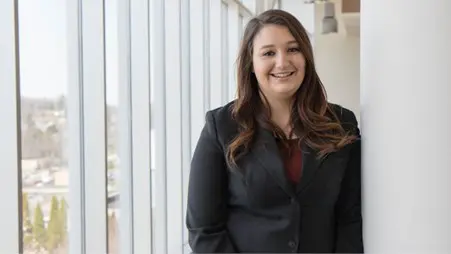Gabrielle Henry-Bevan: Pioneering Public Health Preparedness and Response
Meet Gabrielle Henry-Bevan
From her earliest years, Gabrielle Henry-Bevan's thirst for knowledge and her deep-seated wish to effectuate positive change in the world were unmistakably evident. Hailing from Shavertown, Pennsylvania, she found herself enthralled by the natural sciences and the noble concept of healing. Initially envisioning a future in medicine or veterinary science, her educational path underwent a significant transformation during her time at Keystone College. There, a microbiology course and an enlightening assignment on "The Immortal Life of Henrietta Lacks" ignited a passionate interest in public health, redirecting her ambition towards addressing global health challenges and promoting health equity.

As a participant in the Centers for Disease Control and Prevention (CDC) Research Participation Program, Gabrielle Henry-Bevan contributes to advancing public health emergency preparedness and response initiatives. (Photo Credit: West Virginia University)
This shift towards public health was further solidified by a planned study trip to Africa to research Malaria, which was regrettably canceled due to the Ebola outbreak in 2014. Rather than dissuading her, this incident only intensified Henry-Bevan's resolve to delve into the public health field, propelling her towards a Master of Public Health in Epidemiology at West Virginia University (WVU). At WVU, she immersed herself in public health endeavors, assumed leadership positions within the student association and expanded her professional network through conference participation, all of which enriched her academic and practical understanding of the field.
Her determination to specialize in emergency preparedness and response crystallized further through a practicum at the Center for Threat Preparedness in Charleston, WV, during her graduate studies. This, alongside the onset of the COVID-19 pandemic, motivated Henry-Bevan to seek a fellowship in the Centers for Disease Control and Prevention (CDC) Research Participation Program, aiming to play a direct role in addressing public health emergencies.
As an integral part of the Department of Health and Human Services (HHS), the CDC's Research Participation Programs offer educational and training opportunities for students, recent graduates and university faculty to engage in specific CDC projects and current public health research and development activities.
Mentored by Captain Lisa Delaney, MS, CIH, Henry-Bevan embarked on her journey with the National Institute for Occupational Safety and Health (NIOSH) Emergency Preparedness and Response Office (EPRO) in Morgantown, WV, thereby aligning her career with her longstanding commitment to mitigating public health crises and fostering a safer, healthier world.
Henry-Bevan's role within the EPRO has been multifaceted, addressing the immediate challenges posed by the COVID-19 pandemic and looking beyond to the broader implications of occupational safety and health in emergency preparedness. Her work, ranging from triaging team emails and assisting with situation reports to developing guidance and training materials, underscores the complexity and urgency of responding to public health emergencies. Notably, her efforts to integrate occupational safety into emergency plans reveal a nuanced understanding of the multifaceted challenges that such scenarios present.
The essence of Henry-Bevan's appointment lies in its purpose: to safeguard the well-being of response and recovery workers. This objective, critical in ensuring effective and sustained emergency response efforts, reflects a broader societal impact. By ensuring the health and safety of these essential workers, Henry-Bevan contributes to the resilience and readiness of communities facing public health crises.
Henry-Bevan's experience in the CDC Research Participation Program has been transformative, imbuing her with the skills and insights necessary to navigate the unpredictable nature of public health emergencies. The ability to adapt quickly, a skill honed during her appointment, stands out as a testament to her growth and the dynamic nature of the field. Moreover, her involvement in developing crucial response tools and materials has not only enhanced her professional capabilities but also positioned her as an emerging leader in emergency preparedness and response.
Reflecting on her experience, Henry-Bevan emphasizes the value of teamwork, adaptability, and the continuous pursuit of knowledge in her professional growth. “My experience has been very rewarding,” Henry-Bevan shared. “I work with a great team who have taught me so much in a short amount of time. My colleagues trust me to take the lead when necessary and value my role in the office. Each team member has provided me with insights and advice throughout this journey. My mentor, Lisa, was integral to my fellowship experience. She provided me with opportunities that have expanded my knowledge in emergency and response and the entire public health field.”
Looking ahead, Henry-Bevan’s ambitions remain firmly rooted in advancing public health emergency preparedness and response, a field where her contributions are bound to leave an indelible mark.
Henry-Bevan's story is a compelling narrative of dedication, resilience, and the relentless pursuit of making a difference in the public health domain. As she continues to forge ahead, her experiences serve as a beacon for aspiring public health professionals, illustrating the profound impact one individual can have in protecting and enhancing the health and safety of communities across the globe.
The Research Participation Programs are funded by the CDC and administered through the U.S. Department of Energy’s (DOE) Oak Ridge Institute for Science and Education (ORISE). ORISE is managed for DOE by ORAU.

